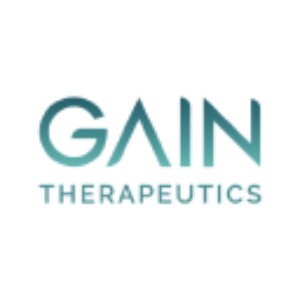Gain Therapeutics Presents New Preclinical Data Showing Promising Pharmacological Activity in Parkinson’s Disease Patient-Derived Dopaminergic Neurons
Gain Therapeutics (NASDAQ: GANX) announced positive preclinical data for its investigational small molecule therapeutic, GT-02287, targeting Parkinson’s Disease. Presented at the Shaare Zedek Medical Center symposium, the study demonstrated significant increases in GCase levels and reductions in α-synuclein aggregates using patient-derived neurons. This suggests GT-02287 may correct GBA1 mutations, which affect 14% of Parkinson's patients. The findings support GT-02287's potential as a disease-modifying treatment, reinforcing Gain's approach using its proprietary computational drug discovery platform.
- GT-02287 showed statistically significant increases in GCase levels.
- Demonstrated reductions in aggregated α-synuclein, a key marker of neurodegeneration.
- Results were based on a model replicating Parkinson’s disease in patient-derived cells.
- None.
Insights
Analyzing...
Accumulating Preclinical Data Provide Further Support for Disease-Modifying Potential of Brain Penetrant Investigational Small Molecule Therapeutic, GT-02287
Results Presented at the Shaare Zedek Medical Center GBA-Parkinson’s Disease Symposium
BETHESDA, Md., Sept. 26, 2022 (GLOBE NEWSWIRE) -- Gain Therapeutics, Inc. (Nasdaq: GANX) (“Gain”, or the “Company”), a biotechnology company transforming drug discovery with its proprietary computational drug discovery platform identifying novel allosteric binding sites and creating small molecule treatments, today announced the presentation of new preclinical data evaluating one of its lead Structurally Targeted Allosteric Regulator (STAR) compounds, GT-02287, for the treatment of Parkinson’s Disease.
Study results were presented at the Shaare Zedek Medical Center GBA Parkinson’s disease symposium by Manolo Bellotto, Ph.D., Chief Strategy Officer & General Manager for Gain Therapeutics, in a presentation entitled, “Non-inhibitory Chaperones for GBA-Parkinson’s Disease.”
The study was conducted using human induced pluripotent stem cells (iPSC) derived from donor patients with GBA-associated Parkinson’s disease, which were then differentiated into dopaminergic neurons. This “Disease in a dish” model is a cutting-edge research strategy used to model diseases outside the human body. In this study, GT-02287, the Company’s lead compound in its Parkinson’s program, demonstrated statistically significant, positive effects across a range of measurable parameters, including an increase in GCase levels and lysosomal transport measured by GCase co-localization into the lysosomes. It also reduced pathologically elevated levels of phosphorylated and aggregated α-synuclein, which are known to be a critical marker of Parkinson’s-induced neurodegeneration.
“We are especially excited by these latest data because they were generated in a model that replicates Parkinson’s disease in patient-derived cells,” commented Matthias Alder, Chief Executive Officer of Gain Therapeutics. “The consistency and strength of these latest data not only support our earlier findings in iPSC-derived neuronal cells from neuronopathic Gaucher Disease patients, but, more importantly, offer further compelling evidence of the disease-modifying potential and unique mechanism of action of our approach.”
The accumulating preclinical data for GT-02287 demonstrate that Gain’s orally bioavailable, brain penetrant small molecule candidate stabilizes and restores the function of misfolded GCase, thus correcting a prominent enzymatic dysfunction underlying GBA1 Parkinson’s disease pathology. Approximately
About Parkinson’s Disease
Mutations in the GBA1 gene, encoding the lysosomal enzyme GCase, represents the most common genetic risk factor for Parkinson’s disease (PD). Impaired GCase function has garnered attention due to its association with α-synuclein pathology in GBA-associated PD patients, but also in sporadic PD, as well as in related α-synucleopathies. Although less investigated, decreased GCase levels and activity are also implicated in the pathophysiology of Alzheimer’s disease (AD). Enhancing the activity of mutant and wild-type GCase may represent a therapeutic strategy for the treatment of a range of neurodegenerative diseases.
About Gain Therapeutics, Inc.
Gain Therapeutics, Inc. is transforming the drug discovery paradigm with structurally targeted allosteric regulators identified with its proprietary computational discovery platform SEE-Tx®. The ability to identify never-seen-before allosteric targets on proteins involved in diseases across the full spectrum of therapeutic areas provides opportunities for a range of drug-protein interactions, including protein stabilization, protein destabilization, targeted protein degradation, allosteric inhibition and allosteric activation. Gain’s pipeline spans neurodegenerative diseases, lysosomal storage disorders, metabolic diseases and oncology. Gain’s lead program in Parkinson’s disease has been awarded funding support from The Michael J. Fox Foundation for Parkinson’s Research (MJFF) and The Silverstein Foundation for Parkinson’s with GBA, as well as from the Eurostars-2 joint program with co-funding from the European Union Horizon 2020 research and Innosuisse. For more information, please visit https://www.gaintherapeutics.com.
Forward Looking Statements
This press release contains “forward-looking statements” within the meaning of the safe harbor provisions of the Private Securities Litigation Reform Act of 1995. Words such as “may,” “can,” “will,” “believe,” “expect,” “plan,” “anticipate,” and similar expressions (as well as other words or expressions referencing future events or circumstances) are intended to identify forward-looking statements. All statements, other than statements of historical facts, included in this press release are forward-looking statements. These statements include, but are not limited to, statements regarding the growth and strategic plans of the Company including development of its current and future collaborations and strategic partnerships. Such forward-looking statements are based on current expectations about our future goals, plans and objectives and involve inherent risks, assumptions and uncertainties, including internal or external factors that could delay, divert or change any of them in the next several years, that are difficult to predict, may be beyond our control and could cause our future financial results, goals, plans and objectives to differ materially from those expressed in, or implied by, the statements. No forward-looking statement can be guaranteed. Forward-looking statements in this press release should be evaluated together with the many risks and uncertainties that affect the Company’s business, particularly those identified in the risk factors discussion in the Company’s Annual Report on Form 10-K, as updated by subsequent Quarterly Reports on Form 10-Q, Current Reports on Form 8-K and other filings with the Securities and Exchange Commission. All information in this press release is as of the date of the release, and the Company undertakes no duty to update this information, except as required by law.
Investor & Media Contact:
Stacey Jurchison
VP, Investor Relations
(410) 474-8200
sjurchison@gaintherapeutics.com
Noor Pahlavi
Argot Partners
(212) 600-1902
Gain@argotpartners.com








